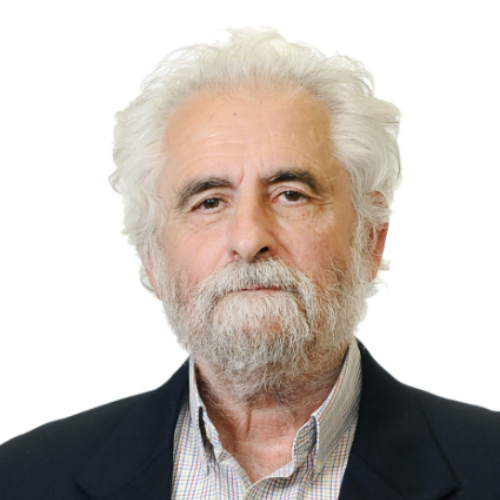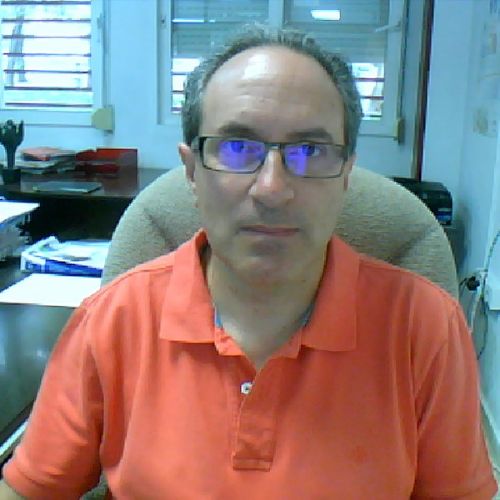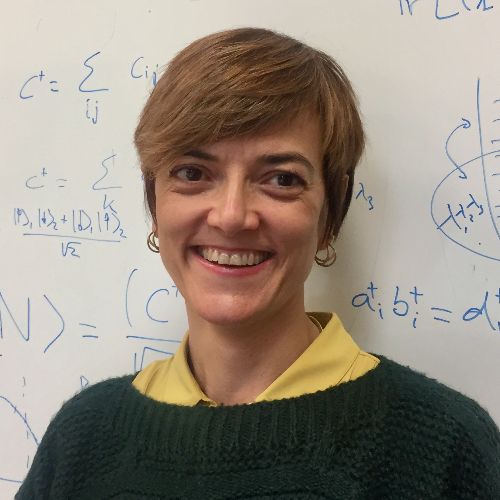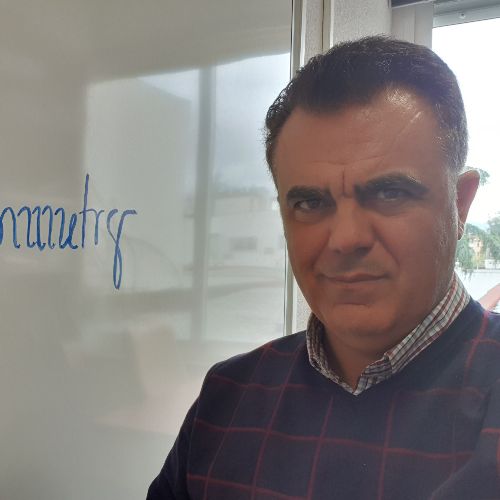Astrophysics Group
The Astrophysics Group is devoted to research in astrophysics and development of astronomical instrumentation. Its scientific programs cover three major areas in astrophysics: (a) star formation and interstellar medium; (c) structure, dynamics and evolution of galaxies and (d) cosmology.
Coordinator: Eduardo Battaner López

Emeritus Professor
University of Granada
Researcher ID: P-7019-2014
ORC ID: 0000-0003-3871-4458
SCOPUS: 7003875704
Group Members
Contratado de Investigación Postdoctoral, University of Granada
Ute Lisenfeld
Senior Lecturer, University of Granada
Mónica Relaño Pastor
Senior Lecturer, University of Granada
Laura Sánchez Menguiano
Programa Investigación Juan de la Cierva, University of Granada
Simon Verley
Senior Lecturer, University of Granada
Statistical Physics and Complex Systems Group
The Statistical Physics and Complex Systems group is devoted to research in the description of emergent macroscopic phenomena from microscopic interactions in classical and quantum condensed systems. We use the methods of theoretical Physics aided by computational tools when necessary, with a special stress on numerical simulations. Research projects under active investigation within the group include: systems biology, noequilibrium statistical mechanics (both classical and quantum), open quantum systems, and neuroscience. The group also organizes the Granada Seminar on Computational and Statistical Physics, an international conference which is held in Granada every two years since 1990.
Coordinator: Pedro Luis Garrido Galera

Full Professor
University of Granada
Researcher ID: P-6477-2014
ORC ID: 0000-0001-8432-4165
SCOPUS: 7006974752
Miembros del grupo
Profesor Titular de Universidad, University of Granada
Ana Paula Millán Vidal
, University of Granada
Jara Juana Bermejo Vega
, University of Granada
Juan A. Bonachela
Senior Lecturer, Rutgers University
Carlos A. Plata Ramos
, University of Sevilla
Félix Carrique Fernández
Full Professor, University of Málaga
Francisco De los Santos Fernández
Senior Lecturer, University of Granada
María Isabel García de Soria Lucena
Senior Lecturer, University of Sevilla
Jesús Casado Pascual
, University of Sevilla
Antonio Ignacio López Lacomba
Senior Lecturer, University of Granada
Joaquín Marro Borau
Emeritus Professor, University of Granada
Pablo Maynar Blanco
Senior Lecturer, University of Sevilla
Michalis Skotinioti
, University of Granada
Miguel Ángel Muñoz Martinez
Full Professor, University of Granada
Carlos Pérez Espigares
Profesor Contratado Doctor Indefinido, University of Granada
José Manuel Romero Enrique
Full Professor, University of Sevilla
Serena di Santo
, University of Granada
Full Professor, University of Málaga
Antonio Prados Montaño
Catedrático de Universidad Responsable del grupo PAIDI FQM-392 (Física interdisciplinar y de no equilibrio), University of Sevilla
Pedro Ángel Bernaola Galván
Full Professor, University of Málaga
José Javier Brey Abalo
Full Professor, University of Sevilla
Pedro Carpena Sánchez
Full Professor, University of Málaga
Julyan Cartwright
Titular del CSIC, Universidad de Granada-CSIC
Álvaro Domínguez Álvarez
Senior Lecturer, University of Sevilla
Pablo I. Hurtado Fernández
Senior Lecturer, University of Granada
Antonio Lasanta Becerra
Profesor Contratado Doctor Indefinido , University of Granada
Daniel Manzano Diosdado
Profesor Titular, University of Granada
Alberto Martín Molina
Senior Lecturer, University of Granada
Jorge Mejías
Assistant Professor, University of Amsterdam
Arturo Moncho Jordá
Senior Lecturer, University of Granada
Pablo Villegas Góngora
, Centro Enrico Fermi (Roma)
Rafael Roa Chamorro
Profesor Titular, University of Málaga
Emilio Ruiz Reina
Senior Lecturer, University of Málaga
Joaquín J. Torres Agudo
Full Professor, University of Granada
Quantum Physics and Mathematical Physics Group
The Quantum Physics and Mathematical Physics group carries out interdisciplinary research in the areas of quantum physics, atomic and molecular physics, applied mathematics, and mathematical physics. We investigate quantum systems, ultra-cold atoms, and cold and ultracold molecules, analyzing their structure, dynamics, manipulation and control by means of external electromagnetic fields. We explore the use of quantum systems in quantum information, quantum cryptography and quantum computing, and look into fundamental aspects of quantum physics. We quantify the internal disorder of many-fermion systems and physico-chemical processes by means of information-theoretical measures of entropy and complexity types. Our interests are also in developing purely mathematical tools corresponding to different branches such as approximation theory, orthogonal polynomials, numerical and asymptotic methods, special functions or information theory, and in their applications in mathematical physics, many-body physics and vision sciences.
Coordinator: Rosario González-Férez

Senior Lecturer
University of Granada
Researcher ID: A-2421-2009
ORC ID: 0000-0002-8871-116X
SCOPUS: 6602200329
Group Members
Full Professor, University of Granada
Rodolfo Octavio Esquivel Olea
Senior Lecturer, Universidad Autónoma de México
Sheila López Rosa
Senior Lecturer, University of Sevilla
Juan José Moreno Balcázar
Full Professor, University of Almería
Pablo Sánchez Moreno
Senior Lecturer, University of Granada
Full Professor, University of Sevilla
María Carmen Gordillo Bargueño
Full Professor, Universidad Pablo de Olavide
Andrei Martínez Finkelshtein
Full Professor, University of Almería
Jesús Sánchez-Dehesa Moreno-Cid
Emeritus Professor, University of Granada
Rafael Yañez García
Senior Lecturer, University of Granada
Hadronic Physics Group
The Hadronic Physics group is focused on hadrons and Theoretical Nuclear Physics. The most significant scientific results cover: * The analysis of scattering reactions of electrons and neutrinos with nucleons and nuclei and the development of a fully relativistic formalism. * The data selection of 8000 neutron-proton and proton-proton scattering data (The Granada-2013 database) which is being used to determine nuclear forces. * The modeling and interpretation of nuclear reaction with exotic beams experiments performed at leading radioactive facilities worldwide. * The analysis of the hadronic-quark-gluon plasma phase transition and characterization of order parameters, as well as the fractal structure of Hadrons at finite temperature and non-equilibrium transport coefficients of hadrons in the hot medium.
Coordinator: Enrique Ruiz Arriola

Full Professor
University of Granada
Researcher ID: A-9388-2015
ORC ID: 0000-0002-9570-2552
SCOPUS: 57110515600
Miembros del grupo
Full Professor, University of Granada
Juan Antonio Caballero Carretero
Full Professor, University of Sevilla
José Antonio Lay Valera
Profesor Contratado Doctor, University of Sevilla
Antonio M. Moro Muñoz
Senior Lecturer, University of Sevilla
Ignacio Luis Ruiz Simó
Profesor Contratado Doctor, University of Granada
Full Professor, University of Sevilla
María Gómez Rocha
Profesora contratada doctora, University of Granada
Eugenio Megías Fernández
Profesor Titular de Universidad, University of Granada
Manuela Rodríguez Gallardo
Senior Lecturer, University of Sevilla
Lorenzo Luis Salcedo Moreno
Full Professor, University of Granada
Nanostructures, Quantum Properties and Mesoscopic Systems Group
Our research is focused on the understanding of quantum properties and critical phenomena ("phase transitions") from nuclear and molecular systems, to nanostructures based in new low dimensional materials and mesoscopic systems, with real and potential applications in the fast developing field of quantum technologies, namely the design and manufacturing of innovative nanodevices with exotic properties, a greater development of next generation electronic and spintronic, as well as for their applications in computation and information quantum theory. Our multidisciplinary group is composed by researchers coming from different areas and institutions, with distinctive scientific backgrounds (physics, mathematics and electronics), but linked by a common thread: the understanding and exploitation of quantum phenomena. Although our main contributions to the field are on basic and fundamental science, we are always committed to look for practical applications of our results. Exemplary subjects and their prospective and actual applications are: Critical Phenomena (Quantum, Shape and Topological Phases of matter), Condensed-Matter Physics (Spin, Quantum Hall systems, 2D Dirac materials, etc), Quantum Sensing and Metrology (Nitrogen-Vacancy sensors, able to detect free radicals and associate them to the presence of specific illnesses), Resistive Random Access Memories and memristor-based nanoelectronic architectures (key components for future chips in neuromorphic computing and hardware oriented applications on artificial intelligence and machine learning, "The human brain project"), etc.
Coordinator: Manuel Calixto Molina

Full Professor
University of Granada
Researcher ID: K-7861-2014
ORC ID: 0000-0002-2566-9590
SCOPUS: 7003462571
Miembros del grupo
Full Professor, University of Sevilla
Blanca Biel Ruiz
Profesora Titular, University of Granada
Nicolás A. Cordero Tejedor
Full Professor, Universidad de Burgos
Julio Guerrero García
Full Professor, Universidad de Jaén
Pedro Pérez Fernández
Profesor Contratado Doctor, University of Sevilla
Juan Bautista Roldán Aranda
Full Professor, University of Granada
Full Professor, University of Sevilla
Miguel Carvajal Zarea
Senior Lecturer, Universidad de Huelva
José Enrique García Ramos
Full Professor, Universidad de Huelva
Francisco Pérez Bernal
Full Professor, Universidad de Huelva
Javier Prior Arce
Senior Lecturer, Universidad Politécnica de Cartagena
Elvira Romera Gutiérrez
Full Professor, University of Granada

